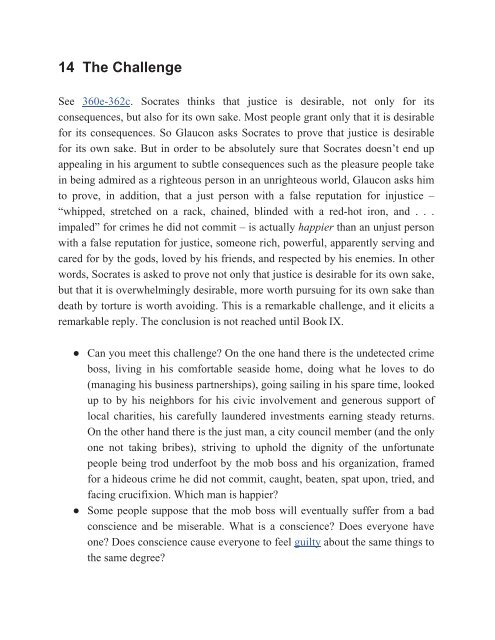The Intelligent Troglodyte’s Guide to Plato’s Republic, 2016a
The Intelligent Troglodyte’s Guide to Plato’s Republic, 2016a
The Intelligent Troglodyte’s Guide to Plato’s Republic, 2016a
Create successful ePaper yourself
Turn your PDF publications into a flip-book with our unique Google optimized e-Paper software.
14 <strong>The</strong> Challenge<br />
See 360e-362c. Socrates thinks that justice is desirable, not only for its<br />
consequences, but also for its own sake. Most people grant only that it is desirable<br />
for its consequences. So Glaucon asks Socrates <strong>to</strong> prove that justice is desirable<br />
for its own sake. But in order <strong>to</strong> be absolutely sure that Socrates doesn’t end up<br />
appealing in his argument <strong>to</strong> subtle consequences such as the pleasure people take<br />
in being admired as a righteous person in an unrighteous world, Glaucon asks him<br />
<strong>to</strong> prove, in addition, that a just person with a false reputation for injustice –<br />
“whipped, stretched on a rack, chained, blinded with a red-hot iron, and . . .<br />
impaled” for crimes he did not commit – is actually happier than an unjust person<br />
with a false reputation for justice, someone rich, powerful, apparently serving and<br />
cared for by the gods, loved by his friends, and respected by his enemies. In other<br />
words, Socrates is asked <strong>to</strong> prove not only that justice is desirable for its own sake,<br />
but that it is overwhelmingly desirable, more worth pursuing for its own sake than<br />
death by <strong>to</strong>rture is worth avoiding. This is a remarkable challenge, and it elicits a<br />
remarkable reply. <strong>The</strong> conclusion is not reached until Book IX.<br />
Can you meet this challenge? On the one hand there is the undetected crime<br />
boss, living in his comfortable seaside home, doing what he loves <strong>to</strong> do<br />
(managing his business partnerships), going sailing in his spare time, looked<br />
up <strong>to</strong> by his neighbors for his civic involvement and generous support of<br />
local charities, his carefully laundered investments earning steady returns.<br />
On the other hand there is the just man, a city council member (and the only<br />
one not taking bribes), striving <strong>to</strong> uphold the dignity of the unfortunate<br />
people being trod underfoot by the mob boss and his organization, framed<br />
for a hideous crime he did not commit, caught, beaten, spat upon, tried, and<br />
facing crucifixion. Which man is happier?<br />
Some people suppose that the mob boss will eventually suffer from a bad<br />
conscience and be miserable. What is a conscience? Does everyone have<br />
one? Does conscience cause everyone <strong>to</strong> feel guilty about the same things <strong>to</strong><br />
the same degree?


















